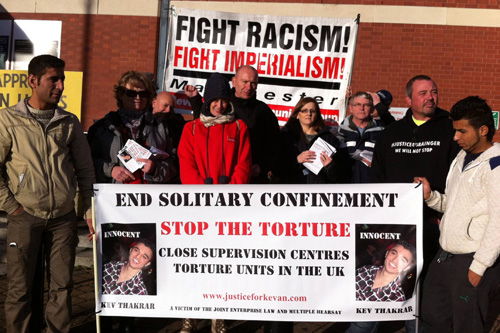
On 19 April the Prison Rules were amended to include a new Rule 46A, which allows for prisoners to be sent to a so-called Separation Centre (SC). These new units are the latest in a long line of small units which the British state has used to control and manipulate prisoners. Kevan Thakrar, who has been held in the Close Supervision Centre (CSC) system since 2010, writes:
The CSC system was initiated in 1998; its purpose was to break those the Prison Service took a dislike to, whether for being physically intimidatory, a constant protester or simply high profile. Over the years this has been very successful with the torturous conditions and regime leading to many CSC prisoners ending up being sectioned under the Mental Health Act, but due to almost constant legal challenges the structure and advertised objectives of the CSC have been forced to change along the way.
House Unit 6 in Woodhill prison originally contained the bulk of CSC cells; however currently only two of the four wings still function as part of the CSC. Of the others, one is a Protected Witness Unit for supergrasses and the other is the Managing Challenging Behaviour Strategy (MCBS) unit – an unofficial CSC without the same formal selection process.
To compensate for the loss of the two Woodhill wings, the Special Secure Units (SSUs) at Full Sutton and Whitemoor prisons have been recommissioned as CSCs. The SSUs were previously used to hold Exceptional High Risk Category A prisoners – mainly Irish prisoners of war – and were heavily criticised by Amnesty International. They now operate a far worse regime than existed in the SSUs, and will do until the next legal challenge or condemnatory report.
As the CSC has developed, the racist tendencies of those managing it have been clear to see, with a disproportionate number of minorities selected for the process. In 2015, this was raised with the prisons’ inspectorate, resulting in a recommendation that: ‘The reasons why the number of black and minority ethnic and Muslim prisoners in the CSC system was so high needed to be better understood to ensure that there was no discriminatory practice.’
Following the publication of this report, rapid steps were taken to deselect and/or section those falling into these categories but the management was not happy with this situation. Propaganda has flowed since about the threat posed by so-called ‘extremists’ in the prison system and the need to separate them from main location prisoners.
So there is now yet another new type of control unit – and one whose entire population will be exclusively made up of the same prisoners who the inspectorate identified as disproportionately detained in the CSC.
Prison Service Instruction (PSI) 5/2017 sets out the SC referral procedure, describing the purpose as ‘to identify those prisoners who may require separation from the mainstream prison population in the interests of national security; to prevent the commission, preparation or instigation of an act of terrorism, a terrorism offence, or an offence with a terrorist connection, whether in prison or otherwise; to prevent the dissemination of views or beliefs that might encourage or induce others to commit any such act or offence, whether in prison or otherwise, or to protect or safeguard others from such views or beliefs; or to prevent any political, religious, racial or other views or beliefs being used to undermine good order and discipline in a prison.’
The PSI states: ‘When a prisoner is identified as requiring a referral to the SC system, the following procedure must be followed. There is a strong presumption that the referral should not be disclosed to the prisoner at this point due to a likely operational risk to security, order and control that may arise from disclosure of this…’ [emphasis added]
The first unit is to be located at Frankland in Durham, a prison with a long history of racism, lacking in diversity and full of ignorance. Although not yet officially publicised, the next unit to become part of this ‘new’ system is House Unit 6C at Woodhill, where prisoners held under the MCBS have been told that they are soon to be relocated.
Changing the name of the unit does not change what it is. It is expected that the first prisoners in the new set-up will receive a half-decent regime to prevent complaints and legal challenges, and to demonstrate how perfect the system is, but beware – this will be temporary, as the insidious nature of control units will claw away at everything until nothing remains that cannot be found in a segregation unit. It is therefore essential that everyone who faces the perilous prospect of relocation into one of these isolation units equips themselves with a top human rights lawyer and prepares themselves for the battles to come.
Kevan Thakrar A4907AE,
HMP Woodhill, Milton Keynes, MK14 4DA, justiceforKevan.org
Fight Racism! Fight Imperialism! 258 June/July 2017




